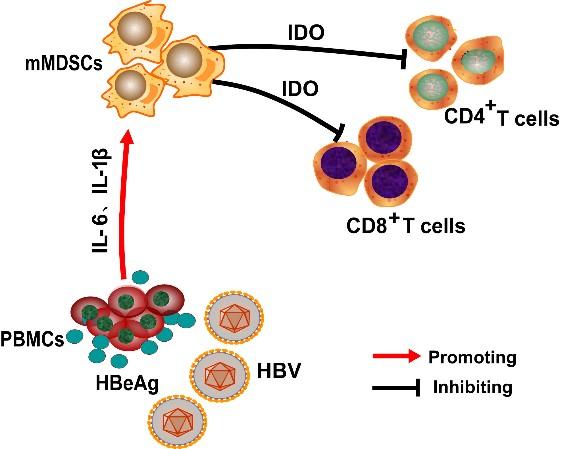
Credit: Yang F, Yu X, Zhou C, Mao R, Zhu M, Zhu H, et al. (2019)
New research sheds light on how a hepatitis B viral protein stimulates the expansion of immune cells that impair antiviral responses, according to a study published April 18 in the open-access journal PLOS Pathogens by Haitao Guo of the Indiana University School of Medicine, Bin Wang and Jiming Zhang of Fudan University, and colleagues. The findings potentially explain how the hepatitis B virus (HBV) establishes and maintains chronic infection, and could lead to the development of novel therapeutic strategies.
HBV is a blood-borne pathogen that chronically infects approximately 350 million people worldwide, and more than 780,000 patients die annually due to HBV-related liver diseases. Chronic HBV infection is associated with impaired virus-specific T-cell responses. Myeloid-derived suppressor cells (MDSCs) are immune cells known to play a critical role in impairing antiviral T-cell responses. In addition, the hepatitis B e-antigen (HBeAg) – a hepatitis B viral protein — may represent a viral strategy to establish persistent infection, but the mechanism remains largely unknown. In the new study, the researchers examined the mechanisms underlying the expansion of MDSCs and the suppression of T-cell responses in persistent HBV infection.
The researchers analyzed the circulation frequency of MDSCs in 164 patients with chronic HBV infection and 70 healthy donors. They found that the frequency of circulating MDSCs in HBeAg-positive patients is higher than in HBeAg-negative patients. Moreover, HBeAg induced the expansion of MDSCs through the upregulation of a molecule called indoleamine-2, 3-dioxygenase (IDO), which plays a critical role in the suppression of T-cell proliferation. According to the authors, the findings suggest a novel mechanism in which HBeAg-induced MDSC expansion impairs T-cell function through the IDO pathway and favors the establishment of persistent HBV infection. The HBeAg-MDSC-IDO axis may therefore serve as an immunotherapeutic target of chronic hepatitis B.
The authors add, “HBV has may tricks to mess up the host immune system for maintaining a persistent infection, HBeAg is one of the culprits. Breaking the HBeAg-IDO-MDSC nexus may hold promise for developing new HBV therapeutics to treat HBeAg-positive patients.”
###
Research Article
Funding: This study is supported by the National Natural Science Foundation of China (81672009, 81471933 and 81400625 to JZ; 81670528 to RM; 30930068, 31430027 and 81672016 to BW), the Major Science and Technology Special Project of China (2017ZX10202202 and 2017ZX10202203-007 to JZ), the Shanghai Municipal Health Funds (201840024 to FY), and the US National Institutes of Health (R01AI110762, R01AI123271, and R01AI134818 to HG). The funders had no role in study design, data collection and analysis, decision to publish, or preparation of the manuscript.
Competing Interests: The authors have declared that no competing interests exist.
Citation: Yang F, Yu X, Zhou C, Mao R, Zhu M, Zhu H, et al. (2019) Hepatitis B e antigen induces the expansion of monocytic myeloid-derived suppressor cells to dampen T-cell function in chronic hepatitis B virus infection. PLoS Pathog 15(4): e1007690. https:/
Author Affiliations:
Department of Infectious Diseases, Huashan Hospital, Fudan University, Shanghai, China
Key Laboratory of Medical Molecular Virology of the Ministry of Health and Ministry of Education, School of Basic Medical Sciences, Fudan University, Shanghai, China
Department of Microbiology and Immunology, Indiana University School of Medicine, Indianapolis, Indiana, United States of America
In your coverage please use this URL to provide access to the freely available paper: http://journals.
Media Contact
Haitao Guo
[email protected]
Related Journal Article
http://dx.




